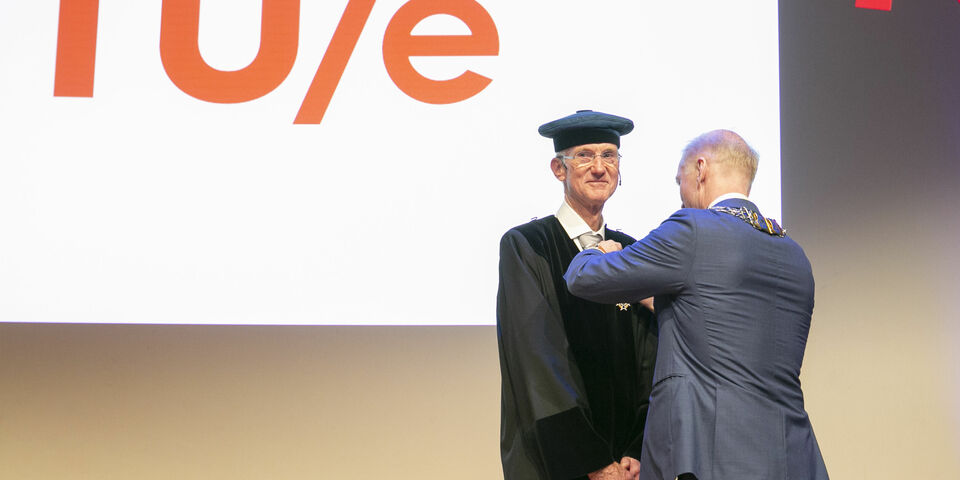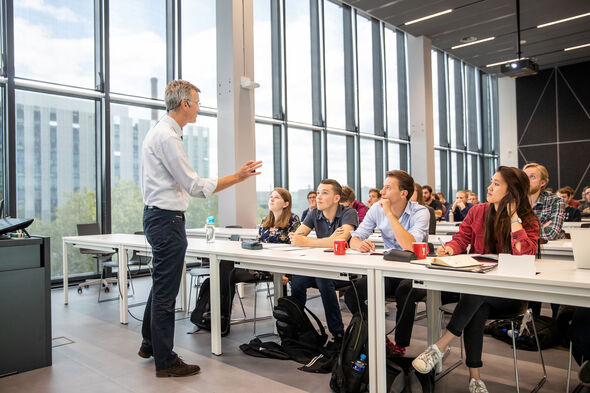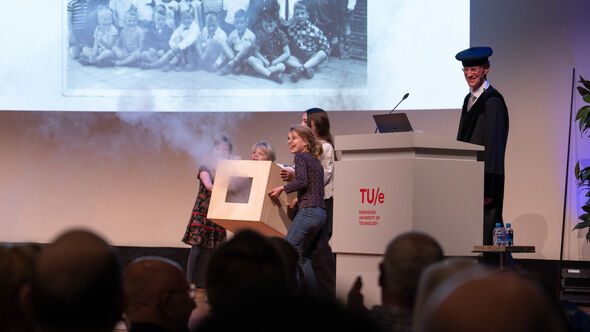Professor Barry Koren receives decoration upon farewell
Thanks to the ‘springboard effect’ of the Centrum Wiskunde & Informatica (CWI), Barry Koren became a full professor at TU/e right away. Now, thirteen years later, he’s saying goodbye to a university that, in his opinion, delivers quality without bragging about it. After his farewell speech on Thursday, he was named Officer of the Order of Orange-Nassau.
With four graduates and five PhD candidates still under his wing, the work for Professor Emeritus Barry Koren at Mathematics and Computer Science (M&CS) isn’t finished yet. “The last PhD candidate started five months ago, so I still have a while to go,” he says with a laugh. Officially, however, he is no longer employed, and yesterday he gave his farewell speech, preceded by a symposium on the occasion of his departure.
From day one, Koren was a full professor at TU/e, something he credits to his time at CWI, the national research institute for mathematics and computer science in the Netherlands, where he started as a PhD candidate. “At institutes that operate under the flag of the Dutch Research Council, you can excel in research. If you’re good, you’ll be appreciated. It works as a springboard.” Although he had the opportunity to stay on at the research institute, he opted for a career at the university. “I wanted to transfer my knowledge to young people and get them excited about it. I don’t see education as filling a vessel with as much knowledge as possible, but as kindling a flame.”
Help create the world
Although Koren chose academia because of the teaching aspect, his heart has always been in research. This has been very diverse over the years. Having started out in aviation and aerospace engineering, he’s now working on a research method to detect breast cancer. “That’s the beauty of mathematics. You have a toolbox of mathematical methods that you can use for all kinds of problems.” Research in applied mathematics often has a clear goal, and that gives direction to the research, he explains. “With my engineering background – fun fact: Koren never studied mathematics – I don’t just want to study the world, but also help create it.”
Perhaps that urge to be meaningful has contributed to Koren becoming very involved in the university. He did so not only as a professor, but also as a member of numerous committees and boards. “I believe that teachers and researchers should participate in the organization of the university,” says Koren. Participating in decision-making isn’t just important, but generally also fun, he says. “It’s interesting. And it can be exciting. You meet all kinds of people, such as professional managers. I like managers and have learned a lot from some of them. There are plenty that are doing a hell of a job.”
From the work floor
Koren also sat on the Departmental Board for a number of years. “It’s quite something, running a department like this.” He should know, because he was acting dean of M&CS twice. “Academic staff can be very critical and principled, often justifiably so. As a dean, you have to know how to deal with that.” In his opinion, it helps if a dean comes from the work floor and knows from personal experience what it’s like to teach and do research, and also understands how the relationships work. And you need a good managing director as well, he adds, because deans coming in from the work floor may not have sufficient knowledge of budget matters, for example.
Koren has been able to fulfill the many roles he has taken on over the years by doing everything in the right measure. That is an important lesson he has learned and one he would particularly like to pass on to young researchers. “Many researchers take on more and more. But actually, whenever you take on a new task, you should always let go of another one.” This approach also meant that a good balance between work and private life was never at risk, despite the fact that he continued to live in Amsterdam the entire time.
Koren is happy that he can now spend more time in Amsterdam. Besides reading dissertations, he can now also help his own grandchildren with their homework. He sees saying goodbye as part of a natural process. “For one thing, I don’t use AI professionally. I have younger colleagues who are really hands-on when it comes to programming and things like that, but I left that behind a long time ago.”
Too modest
Looking back on his time at TU/e, Koren can only be positive. “People work hard here, there’s not a lot of red tape, and relationships are good.” What he finds special is that there’s a great deal of modesty in Eindhoven. Sometimes a little too much, as far as he’s concerned. “There’s a quiet strength in many students. If you were to put them in a group with students from all over the country, they’d blend right in, but when they’re working, they really stand out.”
He has already sent several students to CWI, where they perform above average, he says. It’s typical of a university that delivers quality without bragging about it. At his own department in particular, he sees that who you are or where you come from doesn’t play a role. “It’s about what you do. That has always appealed to me.”
Royal decoration
Koren had a surprise in store for the audience at the end of his farewell speech: his grandchildren provided the grand finale. They hit a box to visualize ring vortices in aerodynamics, with rings of smoke shooting out of the box with each blow. Then it was Koren’s turn to be surprised, by special guest Robert Strijk as deputy mayor of Eindhoven, who appointed him an Officer of the Order of Orange-Nassau on behalf of the king. “I could talk for fifteen minutes about all the roles you held and all the results you achieved, and I’d still have to leave out important things,” Strijk said upon conferring the decoration. Afterwards, Koren - with the award adorning his chest - was sung to by a specially formed choir. Some in attendance softly sang along, “Goodbye, thank you, Mr. Prof, for all you have done.”




Discussion